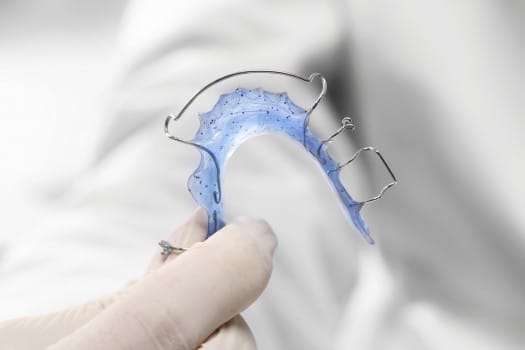After what might have felt like forever, your braces are off and your smile is flawless. But as you probably know, beauty and perfection take work. In order to maintain those results you (and your orthodontist) worked hard to achieve, you will have to put effort into your dental care.
Our teeth naturally move and shift during the course of our lives, and they are most susceptible to unwanted movement right after braces. The teeth need time to anchor into their new positions or they will quickly revert to their former placements.. But don’t worry—if you follow some relatively simple management guidelines, that perfect grin will be yours for many years to come.
Wear Your Retainer!
The most important part of braces actually comes after the orthodontist removes them. Known as the retention phase, this continuation of your orthodontic treatment allows the teeth to settle in their new locations. The orthodontist will prescribe a retainer, which fits over your teeth with just enough pressure to hold them. Most likely, your orthodontist will fit your for a removable retainer, which he typically will ask you to wear most of the time for the first few months and subsequently at night. Fixed retainers also are an option depending on your treatment plan.
Practice Excellent Oral Hygiene
People who take good care of their teeth are less likely to experience tooth movement (though genetics and other factors play a role as well). This is because regular brushing and flossing remove trapped food and bacteria that could cause deterioration of the gums and bones. If you start to notice that your floss slides in and out between certain teeth without resistance—or food collects between them—you should talk to your orthodontist, as this could be the beginning of a shifting tooth.
Schedule Regular Cleanings
Professional cleanings help dislodge trapped bacteria and remove decay around the teeth that a standard toothbrush and dental floss can’t accomplish. During your cleaning, the dentist also will assess the health of your smile, so that he or your orthodontist can quickly correct any problems at an early stage. The number of times per year you need a cleaning will in part depend on your overall dental health. The dentist will direct some patients to come in twice a year, and others three or four times.
Improve Sleep Habits
Sleeping on your stomach actually can lead to tooth movement over time. That’s because teeth move in response to gentle, sustained pressure, and smooshing your face into the pillow—especially a firm one—creates just the right amount of force. From a dental perspective, the best sleeping position is on your back, followed by your side.
Make Your Workspace Ergonomic
If you have a desk job, poor posture actually can lead to tooth movement. This is because many people rest their chin in their hands as they slouch toward their computer screens. This might seem innocuous enough, but if you do it regularly over a period of months or years, the slight pressure may actually move your teeth. Make sure your desk does not sit too high or low, that your computer screen is not too far from you and that your chair has back support.
Stop Grinding/Clenching
Grinding and clenching your teeth (either at night or throughout the day) leads to tooth movement, as the continual thrusting pushes the upper arch out of alignment. If you are no longer wearing your retainer but are experiencing grinding or clenching at night, your dentist may need to create a mouthguard for you to wear during sleep. The mouthguard will be made of a thin, plastic material similar to your retainer.
Orthodontic Associates uses state-of-the-art technology and techniques to get our patients the best possible orthodontic results possible. With nine convenient locations around Baltimore to choose from, contact us for your initial consultation to get your healthy smile. We look forward to making you smile!



